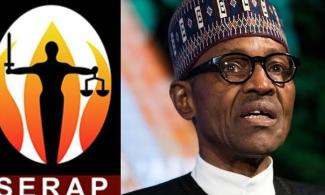
The organisation lamented the government's “failure to thoroughly, effectively and transparently investigate spending on all social safety-nets and poverty alleviation programmes and projects executed between 2015 and 2022.”
The Socio-Economic Rights and Accountability Project (SERAP) has filed a lawsuit against President Muhammadu Buhari over his government's failure to investigate all poverty alleviation programmes undertaken by his administration.
The organisation lamented the government's “failure to thoroughly, effectively and transparently investigate spending on all social safety-nets and poverty alleviation programmes and projects executed between 2015 and 2022.”
Joined in the suit as Respondent is the Attorney-General of the Federation and Minister of Justice, Abubakar Malami (SAN).
A recent report by the National Bureau of Statistics (NBS) shows damning revelations that some 133 million Nigerians are poor, despite the government reportedly spending N500 billion yearly on ‘social investment programmes.’ Half of all poor people in the country are children.
In the suit number FHC/ABJ/CS/2357/2022 filed last Friday at the Federal High Court, Abuja, SERAP is asking the court to “direct and compel President Buhari to thoroughly and transparently investigate the spending on all social safety-nets and poverty alleviation programs and projects executed between 2015 and 2022.”
SERAP is also asking the court to “direct and compel President Buhari to ensure that suspected perpetrators of corruption and mismanagement of public funds meant to take care of the poor face prosecution, as appropriate, and any stolen public funds are recovered.”
In the suit, SERAP argues that “Nigerians have the right to be free from poverty".
"Allegations of corruption in social safety-nets and poverty alleviation programmes pose both direct and indirect threats to human rights, and contribute to extreme poverty in the country,” it said.
SERAP is also arguing that, “investigating the allegations of corruption in the spending on social safety-nets and poverty alleviation programmes and projects and recovering any stolen public funds would serve the public interest.”
The suit filed on behalf of SERAP by its lawyers Kolawole Oluwadare, Kehinde Oyewumi, and Blessing Ogwuche, read in part: “The failure to address extreme poverty has resulted in high levels of inequality, and serious violations of economic and social rights of socially and economically vulnerable Nigerians.
“The NBS report suggests a grave violation of the public trust, and the lack of political will by the government to uphold the country’s constitutional and international human rights obligations.”
“The consequences of corruption are felt by citizens on a daily basis. Corruption exposes them to additional costs to pay for health, education and administrative services."
“The report that 133 million Nigerians are poor suggests corruption and mismanagement in the spending of trillions of naira on social safety-nets and poverty alleviation programmes, including the reported disbursement of over $700 million from the repatriated Abacha looted funds to these programmes.
“The report also shows that the purported social safety-nets and poverty alleviation programmes are clearly not working. It also shows a failure by the government to uphold the constitutionally and internationally guaranteed human rights of the Nigerian people,” it said.
It noted that Section 14(2)(b) of the Nigerian Constitution of 1999 [as amended] provides that, ‘the security and welfare of the people shall be the primary purpose of government.’”
“The 2022 Multidimensional Poverty Index (MPI) Survey reveals that 65% of the poor (86 million people) live in the North, while 35% (nearly 47 million) live in the South. Poverty levels across States vary significantly, with the incidence of multidimensional poverty ranging from a low of 27% in Ondo to a high of 91% in Sokoto.
“The NBS also shows that over half of the population of Nigeria are multidimensionally poor and cook with dung, wood or charcoal, rather than cleaner energy. High deprivations are also apparent nationally in sanitation, time to healthcare, food insecurity, and housing," it added.
No date has been fixed for the hearing of the suit.